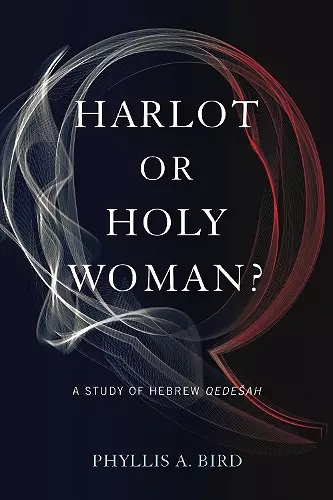Harlot or Holy Woman?
A Study of Hebrew Qedešah
Format:Hardback
Publisher:Pennsylvania State University Press
Published:20th Nov '19
Currently unavailable, and unfortunately no date known when it will be back

Harlot or Holy Woman? presents an exhaustive study of qedešah, a Hebrew word meaning “consecrated woman” but rendered “prostitute” or “sacred prostitute” in Bible translations. Reexamining biblical and extrabiblical texts, Phyllis A. Bird questions how qedešah came to be associated with prostitution and offers an alternative explanation of the term, one that suggests a wider participation for women as religious specialists in Israel’s early cultic practice.
Bird’s study reviews all the texts from classical antiquity cited as sources for an institution of “sacred prostitution,” alongside a comprehensive analysis of the cuneiform texts from Mesopotamia containing the cognate qadištu and Ugaritic texts containing the masculine cognate qdš. Through these texts, Bird presents a portrait of women dedicated to a deity, engaged in a variety of activities from cultic ritual to wet-nursing, and sharing a common generic name with the qedešah of ancient Israel. In the final chapter she returns to biblical texts, reexamining them in light of the new evidence from the ancient Near East.
Considering alternative models for constructing women’s religious roles in ancient Israel, this wholly original study offers new interpretations of key texts and raises questions about the nature of Israelite religion as practiced outside the royal cult and central sanctuary.
“Phyllis Bird deserves praise for amassing all this material into one volume and for her careful and insightful analysis of both biblical and extrabiblical texts.”
—Elaine Adler Goodfriend Review of Biblical Literature
“Exploring the relationship between Orientalism and the myth of sacred prostitution reveals the ongoing significance of Bird’s work. Her book shows how the myth of sacred prostitution is embedded in a broader discourse about fertility and the uncontrolled sexuality of Middle Eastern women—and this may be the lasting legacy of the work.”
—Jessie DeGrado Orientalia
“[W]e must highlight the richness of the research work carried out by the author, the multiplicity of sources studied, whether in Hebrew, Akkadian, Ugaritic or Greek, and the clarity of the speech. We think, thanks to Bird’s work, it was possible to have a clearer picture of the role played by the qedešah within the cultures and religions of the Near Ancient East.”
—Carlos Pereira Cadmo
ISBN: 9781575069814
Dimensions: 229mm x 152mm x 41mm
Weight: 794g
512 pages